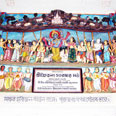Tag: Humility
-
Śrīla Bhakti Sundar Govinda Dev-Goswāmī Mahārāj discusses the proper approach to divinity, and the genuine humility of the true Vaiṣṇavas.
-
Śrīla Bhakti Rakṣak Śrīdhar Dev-Goswāmī Mahārāj discusses the tṛṇād api principles in depth.
-
Śrīla Bhakti Sundar Govinda Dev-Goswāmī Mahārāj affectionately reminds everyone of his foremost advice.
-
Śrīla Bhakti Rakṣak Śrīdhar Dev-Goswāmī Mahārāj explains the proper approach in devotion to the Lord.
-
Śrīla Bhakti Rakṣak Śrīdhar Dev-Goswāmī Mahārāj explains the spirit of humble service.
-
Śrīla Bhakti Rakṣak Śrīdhar Dev-Goswāmī Mahārāj explains the importance of honour and tolerance within the Vaiṣṇava community.







